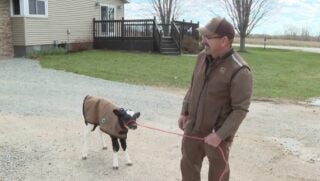West Palm Beach, Florida, was recently full of some very important people. You may know your local extension agent, but did you know that there are hundreds of extension agents working for universities in every state in the country?
In July, there was a welcome dinner held at the Palm Beach Convention Center to kick off the start of the National Association of County Agricultural Agents Annual Meeting and Professional Improvement Conference (NACAA AM/PIC). This meeting, held in a different state each year, is the great gathering of like-minded agriculture extension agents.
While I wasn’t able to attend, I do know the great value this meeting had for agents across the country. Extension is an incredibly useful tool for farmers, ranchers, and all those in the agricultural fields. If you’re not familiar with extension services, it is essentially a “consulting” service, except the “consultants” (your local extension agent) are paid by the university systems, and sometimes by local governments, instead of by the clients (you).
»Related: University extension: What is it and what do extension agents do?
While these systems can be quite vast now with a variety of agent types and content areas, they were originally started to serve farmers and ranchers. The Smith and Lever Act of 1914 enacted into law the establishment of extension systems at land-grant universities in the United States.
My extension service is run by the University of Florida — this is the land-grant university in my state. Land-grant universities focus on agriculture and receive special funding for maintaining research and education in agricultural related fields.
So why is extension so important to agriculture?
Extension serves as the “middle-man” between science/research conducted at universities and the general public. These agents, or in some states called extension educators, help disseminate information on the production of crops, management of said crops, and even the marketing, selling, and use of agriculture products. They know a lot of things about a lot of things.
These services are vital to rural and urban communities, especially as misinformation continues to spread. The information that you receive from an extension agent is research-backed, meaning they have a solid foundation that their recommendations will work.
So, we’ve established how amazing extension is to us as farmers and ranchers, but why do we care they had a conference?
Meetings of like-minded individuals like the NACAA AM/PIC gives an opportunity to work together, facing challenges that are similar across the country, and helping develop solutions to unique problems. This meeting focuses not only on fellowship but also professional improvement of the agents, with presentations on the work that agents are doing across the country and the impacts they are making in their communities.
In many instances, agents come away from this conference with ideas on how they can improve their own programs and serve their clientele better, or they have insights that are fueled by the encouragement of other agents.
On the last day of the conference attendees participated in tours around Florida where they experienced a direct connection with Florida agriculture and natural resources. Some tours visited dairy farms, an iconic part of the south/central Florida area, while some attendees even got to participate in airboat tours of the Florida everglades, one of the most unique natural areas in the country. These tours don’t just focus on the obvious agricultural crops of South Florida like ranching, dairies, citrus, and sugarcane, but also on unique ornamental crops like caladiums and hibiscus, turfgrass. Some of the agents even visited exotic botanical gardens.
These unique experiences help give extension agents a brief look into agriculture in a different part of the country, expanding their view of country-wide food production systems, and hopefully giving them bite-sized information to take back to their clientele.
I was honored that extension agents across the country were in my new state, exploring in the same way I have been doing since moving to Florida some time ago. Florida agriculture has so much to offer in the realm of technology, advancement, and solutions to very unique problems, and I love that this was shared with talented individuals across the country.
I highly recommend reaching out to your local extension agent for support when you are facing issues on your farm, or even explore their other opportunities like 4-H youth development and family and consumer services offerings.
Michelle Miller, the Farm Babe, is a farmer, public speaker and writer who has worked for years with row crops, beef cattle, and sheep. She believes education is key in bridging the gap between farmers and consumers.



